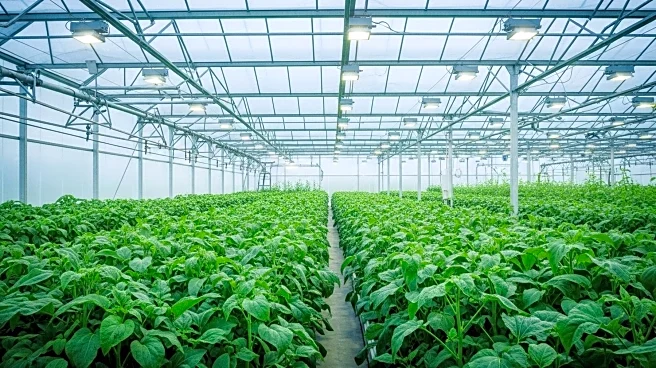What's Happening?
Saudi Arabia's agriculture market is anticipated to grow significantly, reaching a value of USD 207 billion by 2033, according to a report by IMARC Group. This growth is driven by the country's Vision 2030 initiative, which aims to reduce dependence on food imports and enhance food security. The market, valued at USD 130 billion in 2024, is expected to grow at a compound annual growth rate (CAGR) of 5.28% from 2025 to 2033. Key factors contributing to this growth include substantial government investments, strategic partnerships with global agricultural firms, and the adoption of advanced farming technologies such as AI-driven irrigation systems and IoT sensors. These technologies optimize water usage and improve crop yields, supporting sustainable farming practices and enabling Saudi Arabia to export high-quality crops to international markets.
Why It's Important?
The projected growth of Saudi Arabia's agriculture market is significant for several reasons. It aligns with the country's Vision 2030 goals, which focus on achieving agricultural self-sufficiency and reducing reliance on food imports by 65%. This growth is expected to enhance food security and create a robust ecosystem for food manufacturing and production. The adoption of advanced technologies like AI and IoT in farming practices is crucial in overcoming challenges posed by the region's arid climate and water scarcity. Additionally, the expansion of organic farming and eco-friendly agricultural methodologies supports the rising demand for healthy, sustainable food products. These developments not only benefit domestic producers but also position Saudi Arabia as a competitive player in the global agricultural market.
What's Next?
Looking ahead, Saudi Arabia's agriculture sector is likely to continue its transformation through increased investments in high-tech greenhouse development and strategic joint ventures. The establishment of the Jeddah Food Cluster and partnerships with companies like Hilton Foods and NADEC are expected to enhance the Kingdom's food processing capabilities and strengthen supply chain integration. As the country advances its agricultural technologies, further achievements in crop exports and sustainable farming practices are anticipated. The government's emphasis on innovative farming methods and beneficial subsidies will continue to encourage farmers to adopt natural farming practices, contributing to the Kingdom's broader sustainability goals.
Beyond the Headlines
The rapid growth of Saudi Arabia's agriculture market has deeper implications for the region's socio-economic landscape. The shift towards sustainable farming practices and organic farming methods reflects a growing consumer trend towards health-conscious and eco-friendly products. This transformation not only supports the Kingdom's sustainability goals but also promotes food safety and quality standards. The integration of AI and IoT technologies in agriculture represents a significant advancement in precision farming, potentially setting a precedent for other countries facing similar environmental challenges. As Saudi Arabia continues to innovate and expand its agricultural capabilities, it may serve as a model for sustainable agricultural development in arid regions.










